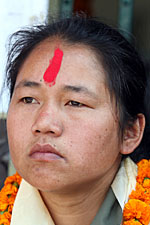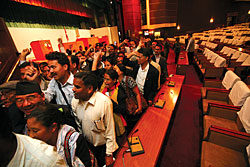 KIRAN PANDAY |
Born in Syangja, Thapa eventually studied at Pokhara's Prithbi Narayan Campus at the time of the 1990 Jana Andolan, when students really started to mobilise and demonstrate. "It was an amazing time, everyone was questioning the kind of society we were living in, everyone was united for a people's democracy," Thapa recalls.
What attracted her to the party was its Maoist ideology. After the 1990 movement she was involved in the Maoist party's Unity Centre as a student leader until the 'people's war' broke out and she had to go underground. She explains, "We believed that an armed rebellion was necessary for the kind of change people desired, which has proven to be true."
Although living as a fighter was physically taxing, she has found that mainstream politics has not been without its challenges. "There's never a dull day in the parliament."
During the war years she served as central bureau chair for Sunsari, Morang and Kapilabastu, as a central committee in-charge for east Nepal, brigade commissar for Mechi, general secretary of the All Nepal Women's Association (Revolutionary), member of the interim parliament and now a CA member and chair of Natural Resources, Economic Rights and Sharing of Revenues committee.
Thapa is well aware of the disenchantment many Nepalis feel about the constitution not being written on time. "The constitution will be written on time only if we rise above the political wrangling and focus on the writing process," she says.
With a full schedule at the committee and the assembly, Thapa hasn't been able to travel as much as she would like to but she did get a glimpse of rural Nepal while travelling to collect suggestions for the new constitution and was struck by the level of political awareness.
She says: "In village after village people asked us to learn from past mistakes and keep them in mind while writing the new constitution."
Mallika Aryal
Clash of the committees
The constitution drafting process is stuck
DHURBA SIMKHADA
 KIRAN PANDAY |
The committees were supposed to submit their proposals by 23 April but this deadline was extended to 22 May. Out of 11 committees, only two kept the deadline and submitted their concept drafts. Another two submitted their drafts a month and a half after the deadline. For the rest of the committees the deadline has again been extended to 9 July.
Says Radheshyam Adhikari of the Judiciary Committee: "All the committees are stuck and have not been able to make the initial draft for the assembly. There is need of a political mechanism composed of senior political leaders." It seems the committees have been unable to reach a consensus because of party instructions. Senior leaders have to intervene to correct this.
The debates within the committees have now embroiled the CA's meetings. Although the issue of language had already been concluded in the committee meeting, it was raised again in the CA where Madhesi members insisted that Hindi should also be used for official purposes. Others wanted Nepali as the official language for communication between provinces.
In the Committee for Protection of the National Interest there is a deadlock over whether the words 'people's war' should be used to describe the conflict. NC leaders also feel the Maoist recommendation to have compulsory military training for all citizens above 18 should also be removed from their draft.
The Constitutional Committee will not be able to submit its draft by 1 July. It has stopped functioning after its chair, Madhav Kumar Nepal, became Prime Minister. The issue of citizenship is also holding up the meetings as Madhesi CA members argue that foreign women who marry a Nepali should immediately be issued a citizenship. The Judicial Committee is stuck over issues like who will define the constitution and who will have the authority to nominate and terminate the Chief Justice?
The State Reconstruction Committee and Natural Resource, Economic Rights and Revenue Distribution Committees are also stuck. Unless there is a high-level mechanism, this impasse will continue. The State Reconstruction Committee is deadlocked over federalism issues like autonomy, political representation, the number of provinces, boundaries and capitals. Buddha Ratna Manandhar, member of the committee and Maoist CA member says: "We will not give in to the pro-status quo groups."


